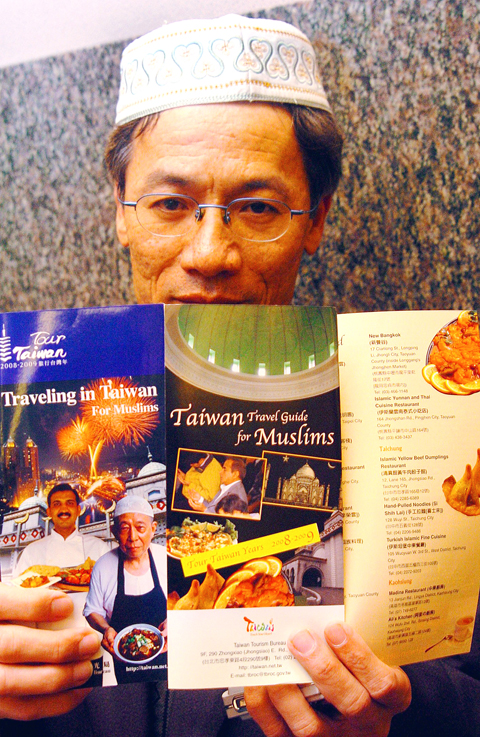The Tourism Bureau plans to launch a campaign to attract Muslim tourists with the target of luring 2,000 Muslims annually in the initial years, a newspaper reported yesterday.
The bureau held a seminar yesterday to introduce the untapped market of Muslim tourists to local travel agents and to discuss strategies that would help attract more Muslim tourists, the United Daily News said.
“There are millions of Muslims in the world who live in India, Malaysia, the Middle East and Arab countries. The potential is huge,” bureau official Liu Hsi-lin (劉喜臨) was quoted as saying.

PHOTO: CHANG CHIA-MING, TAIPEI TIMES
REPRESENTATIVES
He was joined by some 150 representatives from hotels, restaurants, recreational farms and the local Muslim community.
“Today’s seminar is just the start of a series of efforts that the Tourism Bureau will make to tap into the huge Muslim tourist market,” Liu said.
The report said Taiwan has designed three package-tour routes for Muslim tourists and will upgrade facilities at these tourist spots to meet the needs of Muslim visitors.
Taiwan has 60,000 native Muslims as well as 150,000 Muslim workers from Indonesia, Malaysia, Thailand and the Philippines. There are six mosques around the nation.
Attracting Muslim tourists is part of plans to boost inbound tourism, which has been hurt by the global economic downturn.
Last year, the nation saw 3.84 million foreign visitors, falling short of its goal of 4 million.
HALAL
In addition to inviting international Muslim clerics and experts to carry out on-site inspections and plan special itineraries for Muslim tourists, the Chinese Moslem Association in Taiwan is also planning to launch a Halal certification system so that every Muslim visitor can rest assured that they are eating foods consistent with their faith in Taiwan.
Food companies are also being encouraged to produce and export Halal food products to Muslim countries, the report said.

Taiwan is stepping up plans to create self-sufficient supply chains for combat drones and increase foreign orders from the US to counter China’s numerical superiority, a defense official said on Saturday. Commenting on condition of anonymity, the official said the nation’s armed forces are in agreement with US Admiral Samuel Paparo’s assessment that Taiwan’s military must be prepared to turn the nation’s waters into a “hellscape” for the Chinese People’s Liberation Army (PLA). Paparo, the commander of the US Indo-Pacific Command, reiterated the concept during a Congressional hearing in Washington on Wednesday. He first coined the term in a security conference last

Prosecutors today declined to say who was questioned regarding alleged forgery on petitions to recall Democratic Progressive Party (DPP) legislators, after Chinese-language media earlier reported that members of the Chinese Nationalist Party (KMT) Youth League were brought in for questioning. The Ministry of Justice Investigation Bureau confirmed that two people had been questioned, but did not disclose any further information about the ongoing investigation. KMT Youth League members Lee Hsiao-liang (李孝亮) and Liu Szu-yin (劉思吟) — who are leading the effort to recall DPP caucus chief executive Rosalia Wu (吳思瑤) and Legislator Wu Pei-yi (吳沛憶) — both posted on Facebook saying: “I

Sung Chien-liang (宋建樑), who led efforts to recall Democratic Progressive Party (DPP) Legislator Lee Kun-cheng (李坤城), was released on bail of NT$80,000 today amid outcry over his decision to wear a Nazi armband to questioning the night before. Sung arrived at the New Taipei District Prosecutors’ Office for questioning in a recall petition forgery case last night wearing a red armband bearing a swastika, carrying a copy of Adolf Hitler’s Mein Kampf and giving a Nazi salute. Sung left the building at 1:15am without the armband and covering the book with his coat. Lee said today that this is a serious

A mountain blaze that broke out yesterday morning in Yangmingshan National Park was put out after five hours, following multi agency efforts involving dozens of fire trucks and helicopter water drops. The fire might have been sparked by an air quality sensor operated by the National Center for High-Performance Computing, one of the national-level laboratories under the National Applied Research Laboratories, Yangmingshan National Park Headquarters said. The Taipei City Fire Department said the fire, which broke out at about 11am yesterday near the mountainous Xiaoyoukeng (小油坑) Recreation Area was extinguished at 4:32pm. It had initially dispatched 72 personnel in four command vehicles, 16